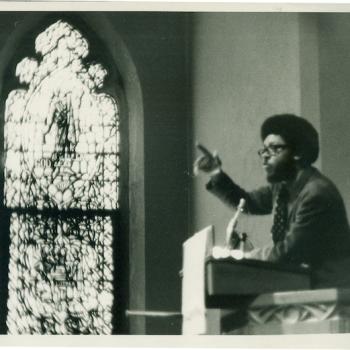This article is an introduction into how evangelicals utilize media.
When we are talking about “media,” we are referring to the many cultural artifacts that evangelical businesses produce. This includes online media, such as websites like Christian Mingle (a dating site for Christians), or social media platforms like Savior Connect. It includes business niches, like Christian Contemporary Music (CCM), Christian Hip-Hop (CHH), Christian clothing brands like Art of Homage, and others.
Christian media is easily recognizable. A surefire way to tell if you are consuming Christian content is to ask, “What is the label ‘Christian’ being attached to?” Thus, Christian music, Christian TikTok, or Christian nightclubs all fit under the label of Christian media.
A Brief History of Evangelical Christian Media
Though the examples given above are contemporary, Christian media is far from new. Of course, there have always been Bibles, epistles, prayer cards, iconography, and so on. But even when looking at media and cultural products as produced by evangelicals, the history of Christian media is far from new.
Heather Hendershot in Shaking the World for Jesus: Media and Conservative Evangelical Culture gives a brief history of how evangelicals have utilized media in the West. Back in the middle of the 1800s, in Victorian times, companies would produce both religious and secular products, such as lamps inscribed with Scripture and other home products. However, after World War I, all things Victorian had fallen out of style, and with them, religious products.
This wasn’t just because of changes in fashion. As Hendershot points out, industrialization, urbanization, and incoming immigrants bringing in different forms of religious life made the American consumer base much more religiously and culturally diverse.
So, around the 1930s and perhaps even before, Christian businesses were founded to fill in this gap of Christian (i.e., evangelical) media. Up until the 70s, Christian products like lamps, pencils, and jewelry were often cheaply made. But by the 90s, the quality of products began to rise significantly. Other innovations, like Christian radio stations beginning in the 20s, further penetrated the secular market.
Purposes of Christian Media

Other than filling a market niche, why produce Christian media? It is interesting to think about the purposes of Christian books, Christian music, Christian meme pages, and so on. Here, we can identify several, not just restricted to sharing the Gospel to nonbelievers.
Christian media can:
- Spread the Gospel to potential converts
- Reach potential converts by “softening their hearts” or “planting seeds”
- Start conversations about Christianity with others
- Create branding for churches and ministries
- Remind believers of Scripture, Christian values, or what it means to live as a Christian in the world
Other purposes can certainly be found. But these are perhaps the most common for why Christians produce and consume Christian media.
We see that Christian media is not only intended for proselytizing. It is also invitational, by inviting others to have conversations about God and religion. Christian media can build relationships or familiarity between Christianity and those unfamiliar with it, even if this does not facilitate immediate conversion. It can build a shared sense of community, like with ministry staff wearing the same clothing, or a church becoming recognizable by building its brand online.
Christian media also serves to strengthen those who already believe. This is what much of CCM, CHH, and Christian clothing seeks to accomplish, by producing content and products which reinforces and edifies Christian living for Christian consumers, helping them live as Christians in their day-to-day lives.
Theologizing Christian Media
However, Christian media comes with difficulties. Even with what some may call a fundamental contradiction. In our economic system, everything comes at a price. And everything must be sold at an even higher price to make a profit.
Keith Green, a Christian rock-and-roll artist, articulated this contradiction well in an interview.
I think it’s wrong to put a price on an item that contains a spiritual message that came free from God. . . . God has given me His word in the Gospel free. He’s given me my talents free. He’s given me the opportunities free. I feel that it’s wrong for me to put any price that would exclude somebody that couldn’t afford it.
Green is saying that if the God’s grace is given to us freely, why should Christians commodify it? In other words, Christian media that puts a price on, for example, concerts or albums, starkly contradict the Gospel, theologically speaking.
Of course, as we have seen before, evangelism is only one possible purpose for Christian media. But even so, Green should be heeded. Considering all the possible purposes for Christian media, we must always discern whether the means we use towards those purposes is right and just. Are our business practices sound? Do we treat church employees and volunteers well? How do we source our materials responsibly when producing physical products? And how can we interact with media in ways that go against worldly patterns of production and consumption?
Inhabiting Culture

Another important discussion that Henderson raises in her book Shaking the World for Jesus is the question of how we relate to “the culture” when we create and consume Christian media.
Some people caricature evangelicals as reactionaries who are always opposed to the world. Evangelicals are sometimes perceived as loathing everything in the world, and wanting nothing to do with it. But in reality, evangelicals interact with the world all the time. And when this happens, there is always a give and take.
In biblical parlance, it is often put this way: we are in, but not of the world (cf. John 15:18–20). Christians are not totally removed from the world and not totally defined by it.
When Christians utilize worldly means (such as printing Bibles in book form, posting iconography on social media, or having a worship band), they utilize culture. But culture also always utilizes them. In the music industry, one can make music for Christ. But it also means that one must sell, as Green put it, “a spiritual message that came free from God.” Opening up a Christian clothing brand means producing helpful reminders and conversation starters for believers to wear. But it also means sourcing cheaply made clothing from impoverished workers laboring in harsh conditions.
Christian Media as Social Engagement?
One last remark, which is fleshed out in these last three sections, is a broader social observation in the evangelical world. Just as evangelicals are depicted as removed from the world, evangelicals are also criticized as socially disengaged. Or perhaps, they are accused of being socially engaged in the wrong ways.
This criticism comes from many evangelicals themselves. Jim Wallis, a prominent voice in the so-called “evangelical left,” has done just this by criticizing the narrow ethic of life often espoused by pro-life evangelicals. Avers Wallis,
In the name of “pro-life” beliefs, we have seen narrow partisan mobilizations that violate . . . a consistent ethic of life. The “seamless garment of life” . . . requires us to go deeper into what will genuinely and most broadly serve life, and the dignity of life, on a wide set of issues and concerns — like poverty, violence, racism, and capital punishment — not just the criminalization of what are tragic and vulnerable decisions often made by poor women in circumstances with great discrepancies of power.
Wallis points out that the pro-life evangelical movement has given evangelicals a strong concern for the sanctity of life. However, this concern for life does not always extend past birth to the many people of the world who do not have their sanctity upheld.
Yet, it is not that evangelicals have disengaged from society. Rather, Christian media has monopolized evangelical social engagement. Evangelicals may not be on the streets protesting. They may not be volunteering en masse at community service organizations. But they certainly are strongly involved with producing Christian media. And this, I will argue, is a form of evangelical activism in its own right.
The Innovation of Christian Radio

Activism and evangelicalism may be a strange combination. But one must remember that terms such as “activism” are often only applied to left-leaning or progressive forms of activism.
To view Christian media as a form of evangelical activism or social engagement, we should briefly point out the origins of this activism: the rise of Christian radio. Here, we will draw from Mark Rogers’s discussion of Christian radio.
Paul Rader was early on the scene of Christian radio. Beginning his radio ministry in 1922, Rader’s radio ministry led the way for preaching the Gospel on a highly effective medium. The rough equivalent of the cell phone today was the radio back then. It was a staple of domestic life. And evangelists like Rader, to put it a bit anachronistically, went viral on the airwaves.
It is worth noting that radio was so new at the time that Christian stations faced harsh criticism from old guard Christians. There were those who claimed that radio airwaves were demonic, in reference to Satan as prince of the air (see Eph. 2:2). But Rader and others defended themselves, saying that they were righteously inhabiting worldly culture to reach people in need of the Gospel.
The suspicion of the new technology eventually dissipated, and Christians began radio stations en masse. This was such a novelty that we might appropriately call the rise of Christian radio a form of Christian activism. It required entrepreneurship, advocacy, and organizing to start and maintain these stations. And these stations also shared a common cause: preaching the Gospel.
Echoes of Christian Radio in the Present
When looking at the present, many pastors still have strong ties to the Christian radio activism that started in the 1920s. In those days, God truly did do a new thing. And many souls were reached because of it.
But Christian innovation has a knack at devolving into Christian complacency. Yes, there were further developments as communication technology developed. And yes, evangelicals were often engaged in further social developments. This was especially true in the 1970s and 80s during the rise of the Moral Majority, where many evangelicals mobilized themselves against civil rights, gay rights, women’s rights, integration in schools, and the sexual revolution.
But today, it seems a great deal of evangelicals remain captivated by communication technologies. There is nothing wrong with this in and of itself. The concerning thing is that these evangelicals make communication technologies the only means of engaging in the world. In certain churches, the focus has been pushed away from pressing issues of poverty, biblical illiteracy, poor discipleship, inequality, etc. What matters is enlarging a church’s brand, or expanding a ministry’s reach online.
The preoccupation with communications media has sadly overshadowed other means of reaching the world. I am unsure as to how widespread this issue is presently. But I, along with others, know that this issue exists and persists in many of our communities.
Perhaps the way forward requires the same amount of bravery that folks like Rader had when going into the unknown world of radio. Evangelicalism flourishes when it innovates, when it finds new ways to speak to and heal the brokenness of the world. We are lacking that innovation and devotion today. Christ’s words ring true today as they always have: the harvest is bountiful, but the workers are few (Matthew 9:37-38).













